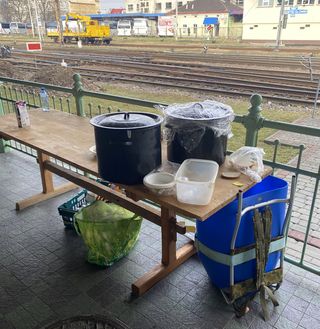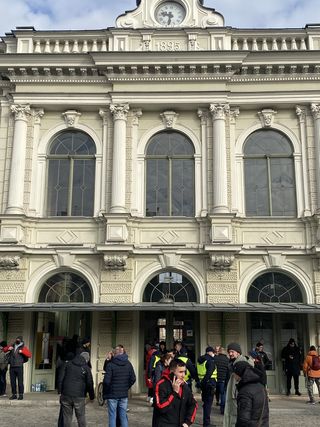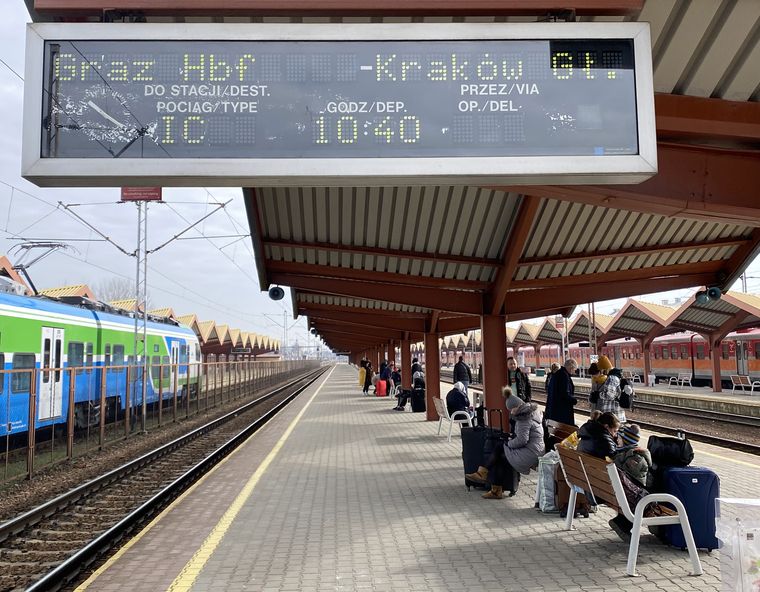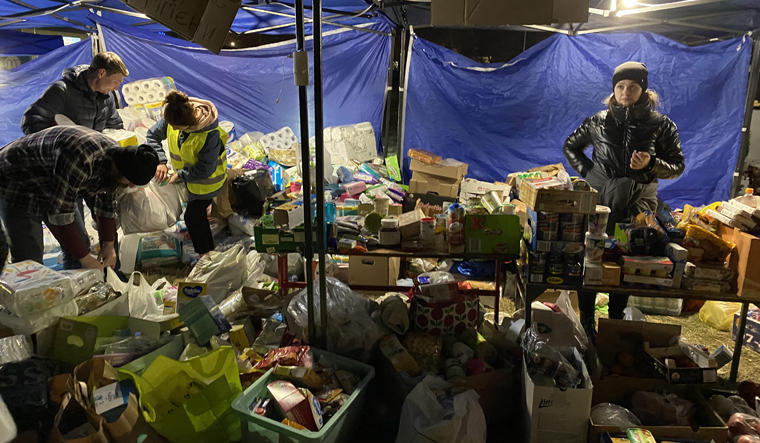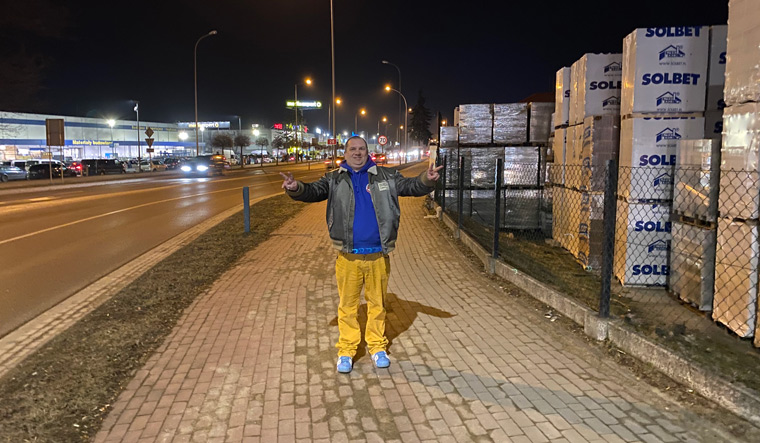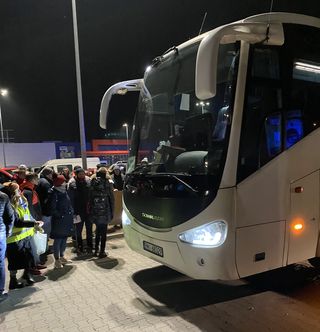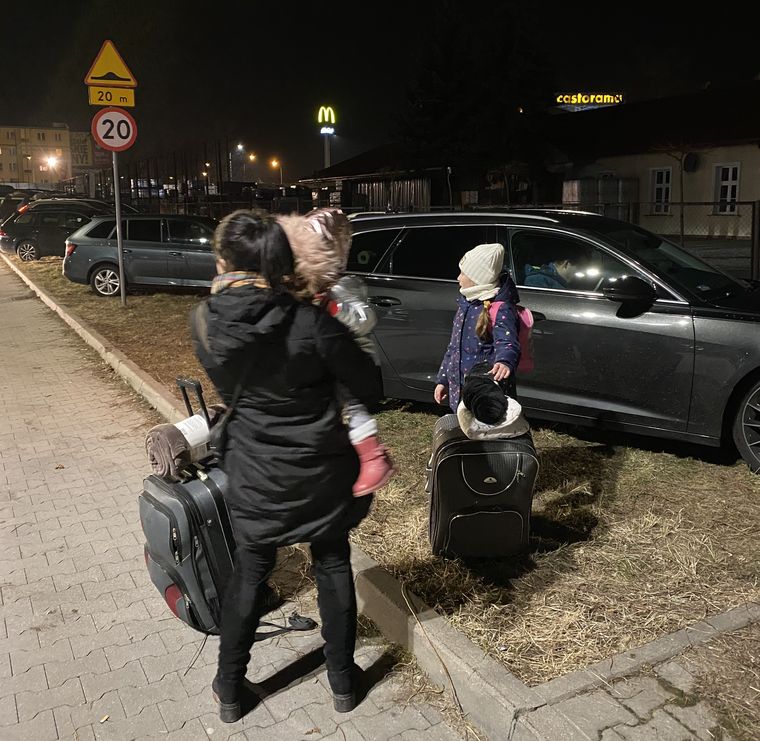Wars and a man I sing, an exile driven on by fate....
Przemysl is a small town in Poland, about 15 minutes from the Ukrainian border. It has a beautiful train station, built in 1895 in the neo-baroque style. The building is lovingly maintained, the chandeliers grand and glittering, the colourful tiles bright and clean, the paintings glowing with colour.
But it was not the building I was looking at when I stepped out of my train. The platform was crowded with people, with tables loaded with coffee urns and vats of soup, with suitcases, with plastic bags overflowing with bread and packets of instant noodles.
At the far end of the platform, a little away from the crush of people, there was a girl sitting on the floor. She was slumped against the railings and had a sleeping bag wrapped around her legs. I smiled at her, making my eyes wider to say hello, and through her exhaustion she instinctively replied with an effort at a smile.
I stopped to say hello. Her voice was so soft that I could barely make it out. I did discover, however, that the sleeping bag wasn’t wrapped around her legs, but rather around a little dog called Archie. Next to Archie was a big package of dog food. It must have weighed at least five kilos.
Can you imagine… fleeing a war, taking whatever you have that may help, needing to take things that will help, knowing you might have to carry it for days, you might have to walk with your things for god knows how long… and instead of a case of water, she carried food for Archie.
The young man next to her looked like Mick Jagger and had a very deep voice. He did most of the talking.
Damian and Erika. 16 and 14 years old.
“Have you come from …,” I asked, my voice trailing off.
Damian nodded, his big dark eyes wary and tired, filled with caution and pain.
“How are you …,” I asked, my voice trailing off again.
They were silent.
“I’m so sorry,” I said.
“Thank you,” said Damian. Erika said something as well but so quietly I couldn’t hear it.
I went to get them coffees and when I came back their mother Anna had rejoined them, so I got her one, too (milk, no sugar). And then we stood on that platform as evening turned to night, as the light faded and the lamps came on, and chatted.
Anna was an illustrator and designer who worked on children’s books. They lived in Kyiv but had decided to go to Lviv for a short holiday three days before Russia invaded. She hadn’t expected the invasion, it really had been planned as a break. But now there they were, about 80 kilometres from the Polish border, and she had a decision to make.
“I feel bad,” she said. “Part of me wants to stay and fight for my country. I want to help.”
I nodded.
“But I have to save my children,” she said, and she turned to look at them for a moment.
I thought of my own son, all of nine months old, and the fierce protective love I feel for him, the utter panic I experienced when he had to be taken to hospital for a few days in December. I nodded. Yes. She had to save her children. So they upped and left, with just the stuff they’d taken with them on their holiday.
The train from Lviv normally takes a couple of hours to get to Przemysl. Anna, Damian and Erika sat in this train for 15 hours. I heard about this train journey from quite a few people while I was in Przemysl. The trains were overcrowded, bursting with people trying to get into Poland. Ravinder, a boy from Delhi, told me, “You know what Indian trains are like, but even in India I’ve never seen anything like this.” People were crying, babies screaming, the toilets overflowing. Food and water began to run out. For hours the train would stand still, tensions rising, the air heavy with suffering and sadness and panic and fear. Fights broke out sometimes. Dogs barked and cats squealed.
“How are you feeling now?” I asked Anna.
“Relieved,” she said. “We got out. I actually feel relaxed right now.”
Also read
- Who is Denis ‘WhiteRex’ Kapustin? Commander of the Russian Volunteer Corps killed in combat
- Ukraine's special services suspected in car bomb killing of Russian general in Moscow
- The ‘mouse’ that roared continues to be heard: Finland and the Russia-Ukraine war
- The digital kill-chain: Russia's mastery of a critical skill in modern warfare
- Russian cargo plane blacklisted by US lands in South Africa; could it strain Pretoria-Washington relations?
- Trump calls India, China 'primary funders' of Ukraine conflict, demands NATO countries to halt Russian energy purchases
But as we talked, it turned out that Anna wasn’t just relaxed. She was also intensely worried about the future. How was she going to feed her kids? She could do some of her illustration and design work online, but the pay was nothing in European terms. She would try to find normal work, she said, maybe as a cleaner or something like that. But she needed papers to work, the papers that would allow her to work legally. Would she get them? How?
At some point, I asked Damian what he was thinking about.
“I am thinking,” he said, “of what I have to do to secure the financial stability of my family.”
I felt Anna’s love rush to her son in that moment, I felt her softness and her despair. She turned towards him and stroked his chest through his jacket.
I asked Damian what he enjoyed studying at school.
“I was going to be a linguist,” he said. “I was good at English.”
Going to be! A boy of 16, talking about a future that was now in the past.
Anna tried to reassure him that he still could be.
“No,” he said. “I did all the school exams but now the records are lost and won’t be transferred.”
Anna and I both tried to reassure him that it would be possible to get his school records and that he would be able to finish school. But he wouldn’t be reassured. He was worried about it and in the worry you could see the little boy breaking through, the boy that he was working very hard to conceal and put away for ever.
Anna and I looked at each other, and in her eyes I saw love and despair and pain.
A woman came up behind us. “Excuse me,” she said to Anna, “do you speak English?” Anna nodded. “Oh great! I’m from the German media, would you be willing to answer some questions?” Anna nodded again, and off they went.
I continued talking to Damian. But something about the situation suddenly made me feel sick so I gave Damian my email address, told him to let me know that they had reached Aachen (Germany) safely.
We shook hands, and in his deep, sonorous voice, Damian said something I couldn’t understand. He repeated it and I realised I had understood it, just that my mind had not expected it.
“May the Lord be with you,” said Damian. It was not a politeness. It was a real wish that Damian was expressing.
“May the Lord be with you,” I replied, and I meant it, too.
I left. Behind me, I heard the German woman asking Anna: “And, what do you think of Putin?”
I walked out of the station, sick of the job of mining people’s suffering for stories.
Later that evening, I walked back to the station with two boxes of pizza. I found Damian and Erika and gave them the boxes. One of the pizzas was vegetarian because I had guessed correctly that Erika was vegetarian, and this fact gave her inordinate joy.
“You’re an amazing person,” said Damian.
I mention this not because Damian is right. I mention it because it shows how much things can mean to people when they’re suffering. And because it shows how much Damian was suffering, that a simple pizza could mean so much to him.
Lukasz Bucior had translated the pizza menu for me. He was standing at the bar, a 43-year-old Polish man with a big belly and a ready smile. While I waited for the pizzas to cook, I had a beer and chatted with him. He had studied in Michigan and worked in England, which was where he had learned his English. But he came from Przemysl and always returned there. He told me that he was on his way to help at a kind of refugee camp and would take me there if I wanted. So we dropped off the pizzas together and then walked about 40 minutes till we reached this camp.
The camp was in a giant car park that had once belonged to a supermarket. It was much, much larger than the area at the train station. Curiously, while the train station had been overrun with reporters and TV crews, the camp was almost devoid of them; apart from me, the only other media presence was a TV crew from South Korea.
One side of the park was where the buses came in, big buses filled with people fleeing Ukraine. Opposite where the buses stopped stood a crowd of people holding up cardboard signs and shouting things. I asked Lukasz about that, and he said they were offering places to stay for the night, to have a shower, or rides to Warsaw or wherever.
“That guy just said he has four beds for one night,” said Lukasz.
“Who are these people?” I asked.
“Just normal people,” said Lukasz.
“From here?”
“Some of them from here. But some have come from other parts of Poland.”
“All for free?”
“Yes.”
In another part of the park there was a line of small tents set up; more precisely, poles had been struck into the ground and cloth hung from those poles as a rudimentary covering. The tents were full of things that had been donated—toilet paper, water bottles, clothes, food. One tent served hot food. At another tent a man stood behind a table and shouted out the drinks that were available. One of them was “chai”—it turns out that Ukrainians have the same word for tea as we do in India.
What can I say of what I saw there?
A group of five: a mother, a grandmother, three children between the ages of four and eight. The children were drinking hot drinks, their faces glowing. The oldest, a girl, had very big eyes. All three were quiet, self-contained.
A mother with a young child—maybe around five—holding her hand and a baby in a stroller.
Three Pakistani boys, only recently moved to Ukraine, now having to leave again, not knowing how to get to Warsaw, worried about going back after having spent the money to get to Ukraine in the first place.
A young boy, about three years old, holding a teddy bear that was bigger than he was. He was struggling to hold it but there was no way he would let it go. His mother next to him, holding a baby in her arms.
I took a photo of them. The mother noticed and shouted at me. I had no defence. I went to her and showed her the phone and showed her that I was deleting the photo.
Later, Lukasz told me that there was a window at the train station where you could drop off stuff to give to the refugees. He had taken two plastic bags filled with teddy bears. “They were asking for teddy bears,” he said. His sister’s kids, eight and six years old, had also offered to give up their own teddy bears. Give them to the children from Ukraine, they had said.
The car park appeared to be a central point from which stuff would not only be handed out to people there, but also taken to places on the border where it was needed. Lukasz and I helped unload and reload cars and vans. There was a great need for nappies somewhere, so we filled up a van with them. But they needed specific sizes, so I spent 10 minutes rifling through piles and piles of nappies to find the right ones.
Size 3 nappies are for young children. Very young. Babies.
It appears to me an iron law of the universe is that where there is suffering, there will also be love. Anna’s love for her children. Damian’s for his family. The love that made Erika carry kilos of dog food for Archie. The love that made Polish people offer their homes and their cars, the love that made them open their hearts, that made them spend their nights making soup, sorting through nappies, arranging clothes. The love that made people give their limited food to their fellow refugees on the train from Lviv to Przemysl.
Yes, there is a lot of love. But let us also not be sentimental.
I began this account with the lines that open the ‘Aeneid’, Virgil’s great epic poem about the exile of Aeneas and the founding of Rome. Later, the ghost of Aeneas’s dead wife tells him what is to come:
“‘A long exile is your fate . . .
the vast plains of the sea are yours to plow
until you reach Hesperian land, where Lydian Tiber
flows with its smooth march through rich and loamy fields,
a land of hardy people. There great joy and a kingdom
are yours to claim, and a queen to make your wife . . .
And now farewell. Hold dear the son we share,
we love together.’”
Aeneas was exiled but his story continued. He knew his story would continue. He knew his suffering would be crowned with great joy and a kingdom, with a queen to make his wife.
The people I met have no such knowledge and could not have it. Because, I realised, that is what something like this is: It is the end of lives, it is the end of stories. Some people will get lucky, some people will pick up the pieces, some people will make new stories. But even for those people, the lives and the stories that they had before Russia invaded—they are over. Done. Finished.
The train back to Austria left from Platform 2. I was there 20 minutes early. There was a woman sitting on a bench. I recognised her instantly as a refugee—the suitcase, the plastic bags. She was talking on her phone to someone.
Next to her sat a little boy. Blond and blue-eyed, with enormous red cheeks. Somehow he made me think of my son and instinctively I stuck my tongue out at him. This delighted the child. He laughed, a rich laugh, a dirty laugh, a laugh that gurgled up from the soles of his little feet and danced through his body and burst out of his mouth. When he laughed, I saw the gaps between his teeth. I did it again. He laughed again. Then he stuck his tongue out, stuck it out as far as he could. He couldn’t laugh while doing this, but his big eyes narrowed into little slits, creasing up with delight.
For a moment, I thought of taking a photo, of talking to the mother… she had somehow made it across the border with this little boy (and a second child, I saw later). Where had they come from? What was the journey like? What had it taken to make that journey? What had they left behind? What was she thinking about? What would happen to the laughing infant?
But I left it. There was this brief golden moment, for all I knew the first such moment in a while, this moment in which the child was gurgling and the mother and I were smiling, in which we were doing something simple and human, something that had nothing to do with war or politics or money or work or missing family or death or any damn thing apart from the laughing present. There were tears in the past and there would be tears in the future. Let them stay there.
We played for 15 minutes, the little boy and I. I said bye and he waved. But he was too lovely to leave so I stayed, still saying bye. He laughed and waved. I told his mother that he reminded me of my son—the same huge cheeks, I said—and asked how old he was. Two, she said. Well, good luck, I said, and waved again, and this time really left.
—Sanklecha is a writer living in Graz, Austria.



